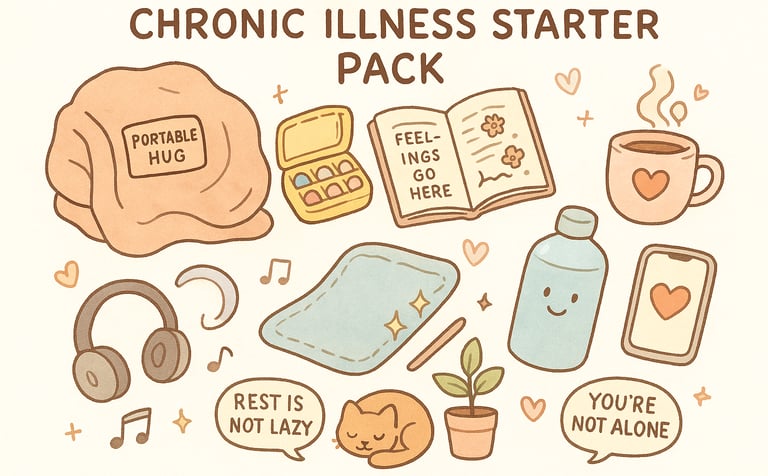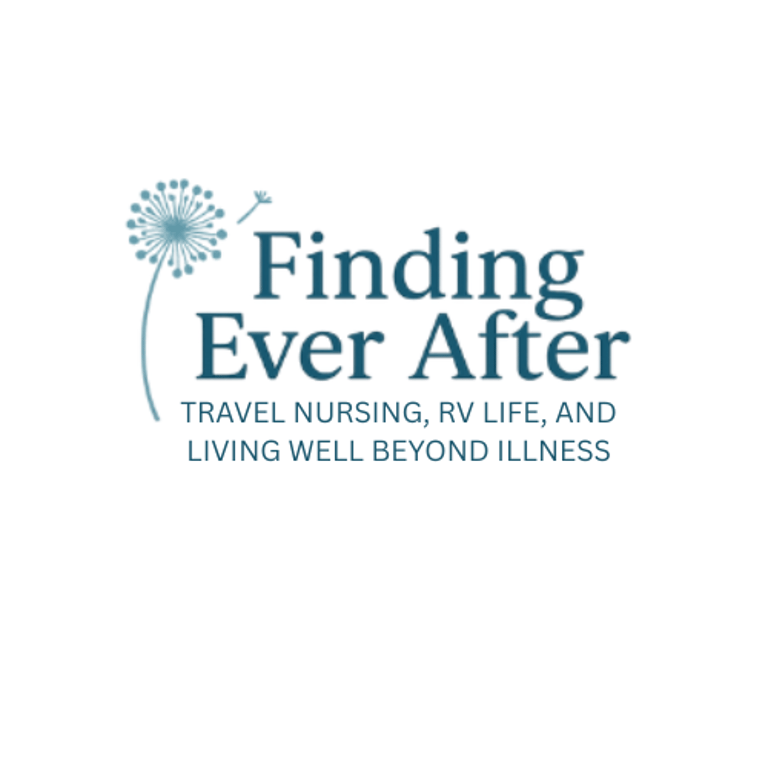A Chronic Illness Starter Pack: What You Really Need When You’re Newly Diagnosed
Getting a chronic illness diagnosis can feel overwhelming and life-changing. This “Chronic Illness Starter Pack” isn’t just generic advice—it’s a compassionate guide to help you navigate grief, manage the practical stuff, and find joy again. Think of it as a care package from a friend who understands.
FACING DIAGNOSIS & FINDING ACCEPTANCE
Velvet Larrabee
8/8/20256 min read


So, you just got diagnosed with a chronic illness.
First of all—take a breath.
If you’re reading this, you might be sitting with a mixture of emotions: fear, sadness, anger, confusion, maybe even a weird sort of relief that at least you finally know what’s wrong. That cocktail of feelings? Completely normal.
Being handed a diagnosis like lupus, rheumatoid arthritis, Sjögren’s, fibromyalgia—or any chronic condition—can feel like someone took your “old life” and scribbled all over it with a marker you didn’t ask for. Suddenly, the things you thought you could count on—your body, your energy, your future plans—feel uncertain. And that’s terrifying.
But here’s the truth: while chronic illness does change your life, it doesn’t erase it. You can still live a life full of joy, meaning, and even adventure—it just might look different than you pictured.
That’s why I wanted to put together this “Chronic Illness Starter Pack.” Not the fluffy, generic advice like “stay positive” or “get plenty of rest.” This is the real, compassionate, human version: the mix of practical tools, emotional truths, and mindset shifts that can help you start navigating this new chapter. Think of it like care-package advice from a friend who gets it.
1. Permission to Grieve (Yes, It’s a Loss)
One of the biggest things people don’t tell you? It’s okay to grieve your old life.
When you’re diagnosed with a chronic illness, you’re not just getting new medical instructions—you’re mourning the loss of certainty, of carefree days, of energy you may never fully get back. That’s real, and it deserves space.
You might feel guilty for grieving (“other people have it worse”), but your pain is valid. Give yourself permission to cry, to rage, to feel numb, to ask why me? This isn’t weakness; it’s part of adjusting to a new reality.
🌱 Pro tip for emotional survival: Journaling, therapy, or even voice-memo venting can help you process the waves of emotion without bottling them up. If you can, find a therapist who understands chronic illness—it makes a world of difference.
2. The Must-Have Medical Basics
Let’s get practical. In the early weeks, things can feel overwhelming—doctor appointments, new medications, maybe even scary words you don’t fully understand. A few basics can help you feel less lost:
A good binder or digital file system. Keep copies of lab results, medication lists, imaging reports, and doctor notes. You’ll thank yourself later when a new specialist asks for your “medical history.”
A medication tracker. Apps like Medisafe or even a simple pillbox can save you from the dreaded “wait, did I already take this?” moment.
A symptom diary. Write down flares, pain levels, fatigue, or anything unusual. Patterns often emerge—and those notes help your doctors fine-tune treatment.
Insurance literacy (ugh, I know). Learn your policy basics: referrals, prior authorizations, out-of-pocket max. It feels like learning a new language, but it’ll save you frustration later.
None of these things make the illness go away—but they give you a sense of control in a situation that often feels uncontrollable.
3. Build Your Support Crew (and Edit as Needed)
This is a hard truth: not everyone in your life will understand your diagnosis. Some people will step up in beautiful, surprising ways. Others may drift away, not out of cruelty, but because they don’t know what to do with your new reality.
That’s why you need to build your “support crew.”
Medical allies: Find doctors who listen and respect your lived experience. If you feel dismissed, you’re allowed to switch providers.
Friends & family: Lean on the ones who show up without judgment. Let go of the idea that everyone has to get it—they won’t.
Community: Online groups (Facebook, Reddit, health forums) can be lifesavers. It helps to talk to people who actually live this, not just read about it.
And yes, you’re allowed to set boundaries. If someone keeps minimizing your illness or saying unhelpful things like “but you don’t look sick,” you don’t owe them emotional labor. Protect your energy—it’s now one of your most valuable resources.
4. Rest Is Not Laziness (Say It Again)
Here’s something you’ll bump into fast: chronic illness fatigue is not the same as “tired.” It’s bone-deep, can’t-keep-your-eyes-open, body-made-of-lead exhaustion. And pushing through it? Often makes things worse.
Rest isn’t weakness, and it isn’t laziness. It’s medicine.
You may have to unlearn years of “hustle culture” and productivity guilt. That’s tough—but also freeing. Your worth was never measured in how much you get done.
🌙 Try this reframe: Instead of asking, “What did I accomplish today?” ask, “What did I give my body today?” Maybe it was hydration, movement, medicine, or just kindness. That counts.
5. Comfort Items (Because Survival Needs Softness Too)
Practical tools are great, but sometimes it’s the small comforts that make life bearable. Here’s a list of things many people with chronic illness swear by:
Heating pad or weighted blanket (hello, pain relief and cozy naps).
Refillable water bottle (hydration is your new bestie).
Noise-canceling headphones for sensory overload days.
A comfortable lounge outfit that still feels “put together.”
Snacks you can grab when you’re too tired to cook.
It may sound silly, but little bits of softness matter when your body feels like it’s working against you.
6. Learn to Say No (Without Apology)
This one’s hard, especially if you’re a people-pleaser. But managing chronic illness means you’ll need to get comfortable saying no.
No to plans you don’t have the energy for.
No to doctors who dismiss your symptoms.
No to guilt-tripping yourself for needing rest.
Saying “no” doesn’t mean you’re letting life pass you by. It means you’re choosing the things that truly matter and letting go of what drains you.
And when you do say “yes,” you’ll actually have more energy to enjoy it.
7. Redefining What “Strong” Means
You’ll hear people say, “You’re so strong!” when they learn about your diagnosis. Some days, that compliment feels hollow—because maybe you don’t feel strong at all. Maybe you feel broken, or angry, or just so, so tired.
But strength doesn’t always look like conquering mountains. Sometimes strength is:
Getting out of bed on a flare day.
Calling the doctor when you’d rather avoid it.
Taking your meds even when you resent them.
Asking for help (yes, that’s strength too).
Living with a chronic illness isn’t about being inspirational—it’s about showing up for yourself, day after day, in big and small ways.
8. Make Space for Joy
This might feel impossible at first. How can you think about joy when you’re grieving and adjusting and drowning in medical stuff? But here’s the truth: you need joy now more than ever.
Joy doesn’t erase your illness—but it makes life worth living alongside it.
Maybe it’s painting, watching your favorite Disney movie, sitting in the sun for five minutes, FaceTiming a friend, cuddling your pet, or eating that ridiculously good pastry without guilt.
Chronic illness will demand many things from you. Don’t let it steal the things that light you up inside.
9. The Long Game: Hope & Adaptation
Here’s the piece most people miss: adaptation is not giving up.
Over time, you’ll find hacks, routines, and workarounds that make life easier. You’ll learn your body’s patterns. You’ll figure out which foods, movements, or therapies help you feel better. You’ll adjust expectations—not in a defeatist way, but in a realistic way that honors your energy.
And slowly, you’ll realize: this new life can still hold beauty. It won’t be the same as before, but it’s still yours.
Final Thoughts
If you’ve just been diagnosed with a chronic illness, you’re probably scared it will ruin everything. I want you to hear this, from someone who understands: your life is not over.
Yes, there will be grief, hard days, and changes you didn’t ask for. But there will also be resilience, unexpected community, softness, and joy you thought might be gone forever.
This “starter pack” isn’t about fixing everything—it’s about helping you feel less lost at the beginning of this journey. You don’t have to do it perfectly. You just have to keep showing up for yourself, one breath, one rest, one choice at a time.
And that? That's more than enough.
This Starter Pack is just the beginning. For a complete guide to coping, adapting, and finding joy beyond your diagnosis, explore my Living with Chronic Illness: A Complete Guide to Thriving Beyond Your Diagnosis.
